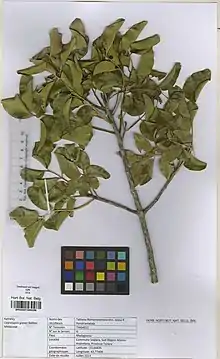Cedrelopsis grevei is an endemic species of tree found in Madagascar. In Malagasy, it is called katafa or katrafay.[1]
| Cedrelopsis grevei | |
|---|---|
 | |
| dried Cedrelopsis grevei | |
| Scientific classification | |
| Kingdom: | Plantae |
| Clade: | Tracheophytes |
| Clade: | Angiosperms |
| Clade: | Eudicots |
| Clade: | Rosids |
| Order: | Sapindales |
| Family: | Rutaceae |
| Genus: | Cedrelopsis |
| Species: | C. grevei |
| Binomial name | |
| Cedrelopsis grevei | |
| Synonyms | |
|
Katafa crassisepalum Costantin & Poisson | |
Distribution
It grows in dry, subarid and subhumid bioclimates, on the West coast in the provinces of Toliara (Tuléar), Mahajanga and Antsiranana (Diego Suarez) in altitudes from 0–900 m. It grows as bush-like tree with a diameter of 0.2 to 1.5 m, reaching a height of 2–9 m. Leaf size is 12–20 cm x 6–8 cm.[4]
Uses
Its stem bark and leaves are used for the production of essential oil that is used in traditional medicine to relieve malaria, fever and muscular fatigue[5]
The wood of the katafa is resistant to rot and insets; it was used for the construction of royal tombs.[1] Its wood is used for construction purposes.[6]
Ecology
Cedrelopsis grevei is considered being of Least Concern (LC).[7]
Synonyms
- Katafa crassisepalum Costantin & Poiss.[8]
References
- Hist. Phys. Madagascar 34(4): , atlas 2, t. 25,1893
- 1 2 Cavalli, Jean-François; Tomi, Félix; Bernardini, Antoine-François; Casanova, Joseph (24 October 2003). "Composition and chemical variability of the bark oil ofCedrelopsis grevei H. Baillon from Madagascar". Flavour and Fragrance Journal. 18 (6): 532–538. doi:10.1002/ffj.1263. ISSN 0882-5734.
- ↑ Rabarison, H. (2018). "Cedrelopsis grevei". IUCN Red List of Threatened Species. 2018: e.T70102674A70163462. doi:10.2305/IUCN.UK.2018-2.RLTS.T70102674A70163462.en. Retrieved 14 September 2022.
- ↑ "Cedrelopsis grevei Baill. & Courchet". Plants of the World Online. The Trustees of the Royal Botanic Gardens, Kew. n.d. Retrieved July 11, 2020.
- ↑ Contribution à la Réalisation de la Pharmacopée malgache by M.N.M.Randovoson 2004, University of Antananarivo
- ↑ www.uu.nl (.pdf, accessed 31.03.2012).
- ↑ eoearth.org. Madagascar Woodland (accessed 31.03.2012)
- ↑ Tropicos
- ↑ tropicos.org
